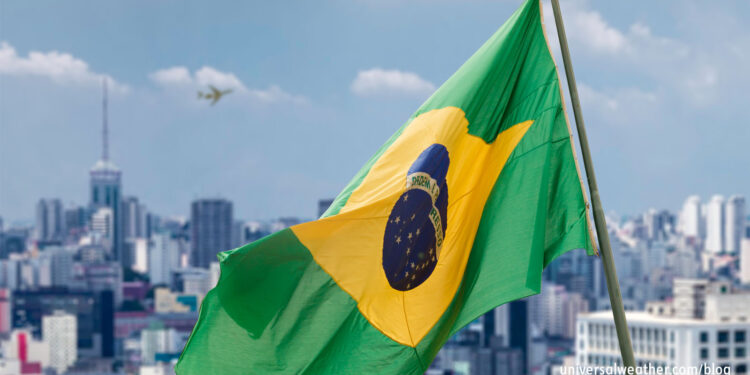UPDATE: Procedural Changes for Customs at Sao Paulo (SBGR) – Part 2: Gen Decs & Documentation

This is a post by authors Marcia Taue. Marcia is based at Universal Aviation Brazil, which has aircraft ground handling facilities in Sao Paulo, Brasilia, Manaus, Recife, and Rio de Janeiro. Marcia is an expert on business aircraft operations in Brazil and can be contacted at marciataue@universalaviation.aero.
This business aviation blog post continues from our article last week, entitled “UPDATE: Procedural Changes for Customs at Sao Paulo (SBGR) – Part 1: New Requirements.“
Sao Paulo Guarulhos (SBGR) has enhanced and expanded gen dec reporting and customs clearance procedural requirements. As these requirements are unique to SBGR, there’s potential for business aircraft operators to fall into non-compliance status. For example, if you leave an undeclared bottle of wine onboard your aircraft at SBGR, you could leave yourself open to fines/penalties.
The following is an overview of what you need to know:
1. Customs documentation requirements
For only one stop in Brazil – one international arrival and departure – it’s only necessary to provide customs with an SBGR-specific gen dec. Your ground handler can do this for you assuming that aircraft, passenger, and crew information is received in advance. If, however, you’re making an international arrival and proceeding on a domestic leg, you should present the following documentation to customs:
- an SBGR-specific gen dec
- a First-Entry permit (known as an AVANAC permit)
- your domestic permit – so customs can revalidate it
- a customs letter for private non-revenue operators (While this is not mandatory, it helps establish that your flight is for private rather than charter [non-scheduled commercial] purposes.)
- a copy of your charter contract if you’re flying a charter (While this is also not mandatory, it’s recommended.)
2. SBGR-specific gen dec – new changes
The specific gen dec format for SBGR requires details of who’s onboard – crew and passenger information – as well as a full list of items that will remain onboard. On the SBGR gen dec, you must notate any spare parts, catering, and liquor, as well as any electronics both integral and not integral to operation of the aircraft (i.e., tablet used for charts, a new laptop brought as a gift, etc.). For a single stop in Brazil, leaving items onboard is not an issue. If, however, you’re proceeding on a domestic leg, all luggage, equipment, catering, and catering supplies must be removed from the aircraft. For example if a bottle of wine or some sodas are left onboard, these must all be declared on the gen dec. Note that no wine, liquor, or catering may remain onboard if your next leg is domestic. You may retrieve these supplies when departing Brazil, or if departing from a different location, you can have them shipped to your home base. If you leave certain items – such as spare parts or iPad entertainment system controllers – on the aircraft, these must be clearly accounted for on your gen dec. SBGR customs have advised that these new gen dec regulations/procedures will eventually be implemented at all international airports in Brazil, but we haven’t seen any regulations indicating that at this time.
3. What to do with items onboard the aircraft
Technically, all onboard beverages – including wine, liquor, and even sodas – as well as all catering supplies, must be removed from the aircraft on arrival if you’re making a second stop within Brazil. This means that onboard wines/liquor will be stored with customs at SBGR for the duration of your stay in Brazil. This can be problematic, especially if you’re departing Brazil from an airport other than SBGR. Alternatively, passengers may take the wines/liquors with them, using their personal customs declarations, and bring them back when they return to the aircraft. It’s not recommended that crew take these items with them as tax is applied to anything they have with them. Personal exemptions cover up to six bottles of wine/liquor per person with a max combined value of $500 USD. Items brought off the aircraft at SBGR in passenger luggage are not required to be noted on the gen dec. In the case of cell phones and other electronic devices, each passenger/crew member is normally permitted to bring one of each into Brazil for temporary use without a declaration. If, however, you have an additional new cell phone/computer with you, this may need to be declared and may attract customs duty taxes.
4. Penalties for non-compliance
Any item found onboard the aircraft and not listed on the gen dec constitutes a crime. If ramp customs inspects your aircraft, they’ll compare the gen dec with what’s onboard. If items are found onboard that are not on the gen dec, these will be confiscated, and fines of up to 10% of the value of your aircraft may be imposed. It’s important to be aware of these new regulatory changes and ensure that all onboard supplies and items are clearly accounted for. Any misstep here can be costly.
5. Additional reading: SBGR Customs Procedure Changes – Series Index
- Part 1 – New customs requirements
- Part 2 – Documentation requirements
- Part 3 – Operating considerations
Conclusion
It’s best to review all customs documentation requirements for SBGR well in advance prior to day of operation. New customs and gen dec reporting requirements for SBGR are permanent and are expected to spread to other airports of entry in Brazil.
Later, we’ll discuss operating considerations for customs clearance at SBGR.
Questions?
If you have any questions about this article or would like assistance planning your next trip to Brazil, contact us at marciataue@universalaviation.aero.




